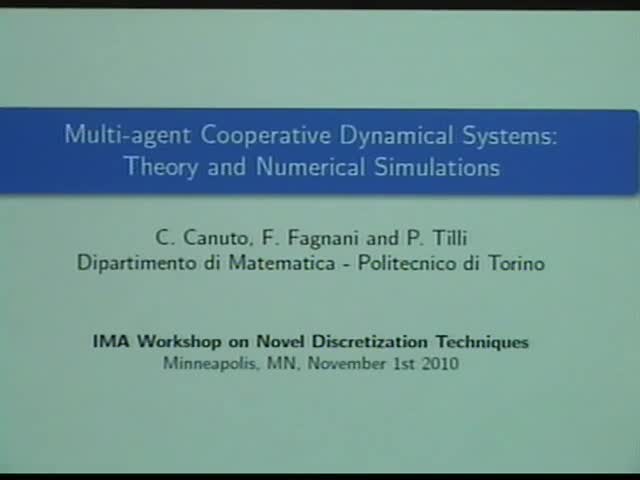Multi-agent cooperative dynamical systems: Theory and numerical simulations
Presenter
November 1, 2010
Keywords:
- Dynamical systems
MSC:
- 70G60
Abstract
We are witnessing an increasing interest for cooperative
dynamical systems proposed in the recent literature as possible
models for
opinion dynamics in social and economic networks.
Mathematically,
they consist of a large number, N, of 'agents' evolving
according to
quite simple dynamical systems coupled in according to some
'locality'
constraint. Each agent i maintains a time function
xi(t)
representing the 'opinion,' the 'belief' it has on something.
As time elapses, agent i interacts with neighbor agents
and modifies its opinion by averaging it with
the one of its neighbors. A critical issue is the way
'locality'
is modelled and interaction takes place. In Krause's model
each agent can see the opinion of all the others but
averages with only those which are within a threshold R from
its current opinion.
The main interest for these models is for N quite large.
Mathematically, this means that one takes the limit for N →
+ ∞.
We adopt an Eulerian approach, moving focus from opinions of
various
agents to distributions of opinions. This leads to a sort of
master
equation which is a PDE in the space of probabily measures; it
can be
analyzed by the techniques of Transportation Theory, which
extends
in a very powerful way the Theory of Conservation Laws.
Our Eulerian approach gives rise to a natural numerical
algorithm based on the `push forward' of measures, which
allows one to perform numerical simulations with complexity
independent on the number of agents, and in a genuinely
multi-dimensional manner.
We prove the existence of a limit measure as t → ∞,
which
for the exact dynamics is purely atomic with atoms at least at
distance R apart,
whereas for the numerical dynamics it is 'almost purely atomic'
(in
a precise sense). Several representative examples will be
discussed.
This is a joint work with Fabio Fagnani and Paolo Tilli.
